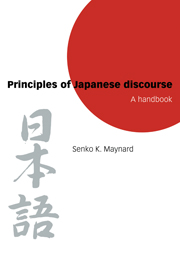Book contents
- Frontmatter
- Contents
- Preface
- Introduction
- To the instructors
- Part I Preliminaries
- Part II Principles
- Part III Selected readings
- 7 Prelude: on reading different genres of contemporary Japanese texts
- 8 Reading Japanese texts
- 9 Tanka and essay R1: from Yotsuba no Essei (“The Four-leaf Essay”) by Machi Tawara
- 10 Narrative R2: Ari to Kirigirisu (“The Ant and the Grasshopper”) from Mirai isoppu (“Future Aesop's Fables”) by Shin'ichi Hoshi
- 11 Newspaper opinion column R3: Kootsuu Anzen Sofuto (“The ‘Soft’-ware for Traffic Safety”) from Asahi Shimbu
- 12 Magazine advertisement R4: Pro-Keds shoes advertisement from Popeye, a young men's magazine 204
- 13 Comic R5: from Kureyon Shinchan
- 14 Newspaper essay: R6: Tensei Jingo from Asahi Shimbun
- 15 Essay R7: Sabaku e no Tabi (“Traveling to the Desert”) by Tetsuroo Morimoto
- Part IV Appendices
- References
- Index
9 - Tanka and essay R1: from Yotsuba no Essei (“The Four-leaf Essay”) by Machi Tawara
Published online by Cambridge University Press: 08 February 2010
- Frontmatter
- Contents
- Preface
- Introduction
- To the instructors
- Part I Preliminaries
- Part II Principles
- Part III Selected readings
- 7 Prelude: on reading different genres of contemporary Japanese texts
- 8 Reading Japanese texts
- 9 Tanka and essay R1: from Yotsuba no Essei (“The Four-leaf Essay”) by Machi Tawara
- 10 Narrative R2: Ari to Kirigirisu (“The Ant and the Grasshopper”) from Mirai isoppu (“Future Aesop's Fables”) by Shin'ichi Hoshi
- 11 Newspaper opinion column R3: Kootsuu Anzen Sofuto (“The ‘Soft’-ware for Traffic Safety”) from Asahi Shimbu
- 12 Magazine advertisement R4: Pro-Keds shoes advertisement from Popeye, a young men's magazine 204
- 13 Comic R5: from Kureyon Shinchan
- 14 Newspaper essay: R6: Tensei Jingo from Asahi Shimbun
- 15 Essay R7: Sabaku e no Tabi (“Traveling to the Desert”) by Tetsuroo Morimoto
- Part IV Appendices
- References
- Index
Summary
INTRODUCTION
This brief portion of an essay is taken from a 1988 book titled Yotsuba no Essei “The Four-leaf Essay” by Machi Tawara. The book features essays commenting on some of her tanka which had become popular earlier in her tanka collection Sarada Kinenbi “The Salad Anniversary” (1987). For Sarada Kinenbi she received the 32nd Modern Tanka Poets Association Award in 1988. Formerly a high school teacher, she is a celebrated tanka poet/essayist/critic in the Japanese literary world. The excerpt to follow contains her comment on her tanka, given in line.
A few words about tanka (and waka) are in order here. Traditional Japanese verses are based on the mora-count; moras refer to consonantfollowed-by-vowel syllables and the sound of “n” counted as one syllable. Different types of poetry are usually distinguished by the number of moras they contain. The tanka is a poem with 31 moras, arranged in lines of 5, 7, 5, 7, and 7 moras. (The haiku contains 17 moras in three lines of 5, 7, and 5 moras.) The earliest collection of waka, Man'yooshuu, was compiled in the late eighth century. In Japan today, many people, especially when they reach a mature age, enjoy composing tanka and haiku. Newspapers regularly print tanka and haiku sent in by readers and selected by leading poets and critics. Many tanka and haiku lovers organize groups which often publish their members’ works in monthly journals.
- Type
- Chapter
- Information
- Principles of Japanese DiscourseA Handbook, pp. 177 - 181Publisher: Cambridge University PressPrint publication year: 1998



